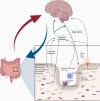Glioma and the gut-brain axis: opportunities and future perspectives
- PMID: 35591978
- PMCID: PMC9113089
- DOI: 10.1093/noajnl/vdac054
Glioma and the gut-brain axis: opportunities and future perspectives
Abstract
The gut-brain axis has presented a valuable new dynamic in the treatment of cancer and central nervous system (CNS) diseases. However, little is known about the potential role of this axis in neuro-oncology. The goal of this review is to highlight potential implications of the gut-brain axis in neuro-oncology, in particular gliomas, and future areas of research. The gut-brain axis is a well-established biochemical signaling axis that has been associated with various CNS diseases. In neuro-oncology, recent studies have described gut microbiome differences in tumor-bearing mice and glioma patients compared to controls. These differences in the composition of the microbiome are expected to impact the metabolic functionality of each microbiome. The effects of antibiotics on the microbiome may affect tumor growth and modulate the immune system in tumor-bearing mice. Preliminary studies have shown that the gut microbiome might influence PD-L1 response in glioma-bearing mice, as previously observed in other non-CNS cancers. Groundbreaking studies have identified intratumoral bacterial DNA in several cancers including high-grade glioma. The gut microbiome and its manipulation represent a new and relatively unexplored area that could be utilized to enhance the effectiveness of therapy in glioma. Further mechanistic studies of this therapeutic strategy are needed to assess its clinical relevance.
Keywords: fecal metabolites; glioblastoma; glioma; gut microbiome; gut–brain axis.
© The Author(s) 2022. Published by Oxford University Press, the Society for Neuro-Oncology and the European Association of Neuro-Oncology.
Figures



References
-
- Blacher E, Bashiardes S, Shapiro H, et al. Potential roles of gut microbiome and metabolites in modulating ALS in mice. Nature. 2019;572(7770):474–480. - PubMed
-
- Routy B, Le Chatelier E, Derosa L, et al. Gut microbiome influences efficacy of PD-1-based immunotherapy against epithelial tumors. Science. 2018;359(6371):91–97. - PubMed
Publication types
Grants and funding
LinkOut - more resources
Full Text Sources
Research Materials
